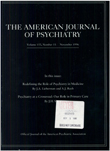Validity of self-defeating personality disorder
Abstract
OBJECTIVE: The purpose of this study was to assess the validity of DSM- III-R self-defeating personality disorder. METHOD: Applicants for inpatient treatment of personality disorders (N = 100) or psychoanalysis (N = 100) were independently evaluated face to face by experienced clinicians using the Structured Clinical Interview for DSM- III-R and the Personality Disorder Examination. Internal consistency; agreement between assessments; diagnostic efficiency of criteria; prevalence; sex ratio; comorbidity with axis I and II disorders; and relationship to education, current employment, and selection for psychoanalytically oriented treatment were examined. RESULTS: The internal consistency of the criteria set and the agreement between psychiatric assessments of self-defeating personality disorder were fair. The most discriminating criteria were those referring to a) choices leading to disappointment, failure, or mistreatment and b) rejection of opportunities for pleasure. A consensus diagnosis of self- defeating personality disorder was more common than all but three other axis II disorders. The sex ratio of the subjects with this diagnosis was not significantly different from the sex ratio of the entire subject group or of patients with other personality disorders. Significant comorbidity with borderline and dependent personality disorders and with current mood disorders was found. Patients with self- defeating personality disorder resembled patients with other personality disorders in educational attainment and treatment assignment. They were more likely to be employed. CONCLUSIONS: These data lend little support to the validity of self-defeating personality disorder as a separate personality disorder category.
Access content
To read the fulltext, please use one of the options below to sign in or purchase access.- Personal login
- Institutional Login
- Sign in via OpenAthens
- Register for access
-
Please login/register if you wish to pair your device and check access availability.
Not a subscriber?
PsychiatryOnline subscription options offer access to the DSM-5 library, books, journals, CME, and patient resources. This all-in-one virtual library provides psychiatrists and mental health professionals with key resources for diagnosis, treatment, research, and professional development.
Need more help? PsychiatryOnline Customer Service may be reached by emailing [email protected] or by calling 800-368-5777 (in the U.S.) or 703-907-7322 (outside the U.S.).



